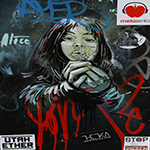Euroacademia Conferences
 Europe Inside-Out: Europe and Europeanness Exposed to Plural Observers (9th Edition) April 24 - 25, 2020
Europe Inside-Out: Europe and Europeanness Exposed to Plural Observers (9th Edition) April 24 - 25, 2020 Identities and Identifications: Politicized Uses of Collective Identities (9th Edition) June 12 - 13, 2020
Identities and Identifications: Politicized Uses of Collective Identities (9th Edition) June 12 - 13, 2020 8th Forum of Critical Studies: Asking Big Questions Again January 24 - 25, 2020
8th Forum of Critical Studies: Asking Big Questions Again January 24 - 25, 2020 Re-Inventing Eastern Europe (7th Edition) December 13 - 14, 2019
Re-Inventing Eastern Europe (7th Edition) December 13 - 14, 2019 The European Union and the Politicization of Europe (8th Edition) October 25 - 26, 2019
The European Union and the Politicization of Europe (8th Edition) October 25 - 26, 2019 Identities and Identifications: Politicized Uses of Collective Identities (8th Edition) June 28 - 29, 2019
Identities and Identifications: Politicized Uses of Collective Identities (8th Edition) June 28 - 29, 2019 The European Union and the Politicization of Europe (7th Edition) January 25 - 26, 2019
The European Union and the Politicization of Europe (7th Edition) January 25 - 26, 2019 7th Forum of Critical Studies: Asking Big Questions Again November 23 - 24, 2018
7th Forum of Critical Studies: Asking Big Questions Again November 23 - 24, 2018 Europe Inside-Out: Europe and Europeanness Exposed to Plural Observers (8th Edition) September 28 - 30, 2018
Europe Inside-Out: Europe and Europeanness Exposed to Plural Observers (8th Edition) September 28 - 30, 2018 Identities and Identifications: Politicized Uses of Collective Identities (7th Edition) June 14 - 15, 2018
Identities and Identifications: Politicized Uses of Collective Identities (7th Edition) June 14 - 15, 2018
Party Discourse about European Future: Political Parties, Elections, Manifestos and Metaphors
-
-

-
Presentation speakers
- Jan Kovár, Metropolitan University Prague & Institute of International Relations Prague, Czech Republic
Abstract:
Political parties play an important role in offering the voters different choices on the European Union (EU) and European integration. The literature on party positions on European integration and closely related literature on Euroscepticism relies largely, from the methodological point of view, on coding of election manifestos/programs and expert surveys/judgments. Recently, these two conventional approaches were complemented by the EU Profiler project, a pan-European research endeavour, that invites political parties to place themselves on political issues related to the European integration process. This paper opts for a different approach to study the party positions on European integration, an approach based on the analysis of metaphors used by political parties in the discourse about the future form of European integration. Although the analysis of metaphors has been providing an increasingly popular tool of examining international politics since the early 1990s, the application to studies of European integration and the EU has been much scarcer. On the basis of key conceptual metaphors used in discourses on the future of the EU that are identified from relevant literature, I analyze Czech political parties’ election manifestos issued for the 2004 and the 2009 European Parliament elections. The analysis is, subsequently, connected to party positions on European integration and Euroscepticism. -
Related Presentations

Statelessness: Challenging the “Europeaness” in the Baltics
- Anya Gromilova

The Role of Art in Diplomacy and State’s International Representation in Latvia (1918–1940)
- Ginta Gerharde-Upeniece

Jan Patočka via Jacques Derrida: Phenomenology, Deconstruction and the European Eidos
- Ruhtan Yalçıner















